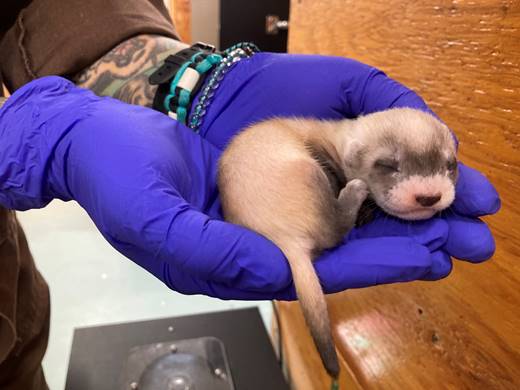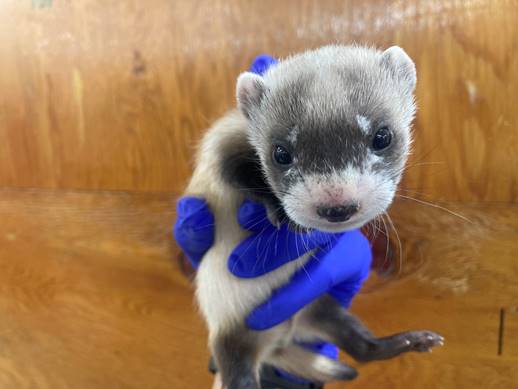
YOUR TORONTO ZOO ANNOUNCES BIRTHS OF ICONIC NORTH AMERICAN SPECIES: THE ENDANGERED BLACK-FOOTED FERRET


Black-footed ferret kits, Photo Credit: Toronto Zoo
These sixteen kits are the result of a highly specialized breeding program that has overcome hurdles at various stages: introductions between males and females, conception, pregnancy, birth, and rearing. Ferrets can be picky about their mates, so housing a large number of ferrets is key to success! The Species Survival Plan ranks every possible pairing among the ferrets housed at the Zoo, and keepers painstakingly introduce individuals, working their way through the list until they find compatible couples that will breed (this year, Coconut proved to be a popular male!). Cytology checks are used to determine if breeding was successful, and then keepers have to wait 43 days to see whether the presumed pregnancy results in kits. Closed-circuit cameras allow keepers to unobtrusively monitor expectant mother ferrets in their nest boxes. Minimizing disturbance with young litters is key as this species can be very sensitive to disturbance and not all kits survive even in the best of circumstances.
Twenty-one adult black-footed ferrets currently call the Toronto Zoo home, and four females successfully produced offspring this year. The first three kits were born on May 19th to mom Guess and dad Coconut; five kits were born on June 1st to Aviana and Coconut, four kits were born on June 3rd to mom Abuela and dad Chestnut, and four kits were born on June 10th to Nana and Coconut.
At your Toronto Zoo, the black-footed ferret breeding program is out of the public eye in one of our specialized conservation breeding centres along Meadowvale Road. Toronto Zoo staff consisting highly trained professionals dedicate their time and efforts to success of this conservation program, some of which have over five years of experience working with this important Canadian species. The ferrets are housed under strict quarantine conditions to protect them from disease and ensure their health. They are provided with specialized diets, enclosures which are furnished to allow for natural behaviours (such as tunneling, climbing, and nesting), and have specialized lighting to stimulate natural patterns. In Toronto, breeding takes place in April and May and prior to giving birth females create a den in an “underground” nest box that they access through a long tunnel. Litters generally have 3-4 kits, but may range from as few as one to as many as ten! The kits develop rapidly, and by the fall are independent of their parents. While some of this year’s kits will remain in the managed breeding program, most will be sent to the US National Black-Footed Ferret Conservation Center in Colorado which coordinates “boot camp” training before the ferrets are released into the wild.
Your Toronto Zoo received our first black-footed ferrets in 1992, and is one of just six facilities in the world that breeds this species. Over 400 kits have been raised at the Zoo to date, the majority of which have been reintroduced to the wild in USA, Mexico, and Canada. The release component of this Species Survival Plan is the sole reason that black-footed ferrets exist today in the wild. The species was considered extinct until a tiny remnant population was discovered in 1981 and brought into human care for managed breeding. This conservation breeding program has since re-established this species back into the North American prairies, where the population numbers over 300 animals and at least four populations are considered self-sustaining.
“Reintroducing the black-footed ferret is of great conservation significance,” said Dolf DeJong, CEO, your Toronto Zoo. “By reintroducing an endangered species back into the North American prairies, your Zoo and its many partners have proven that species-at-risk recovery programs can be successful. We are very excited and hopeful for the continued recovery of the black-footed ferret population,” he added.
These breeding and reintroduction programs are putting more endangered species back into the wild. But as important as they are, these conservation programs are funded almost entirely by donations and grants. Your support for our Toronto Zoo’s animal conservation programs – for our ferrets, and all the endangered animals at the Zoo – means you are a partner in the fight against extinction. Find out how you can support these programs through the Toronto Zoo Wildlife Conservancy.
-30-
To learn more about Toronto Zoo’s projects to support Canadian species:
Media Contact Information:
Katie Gray
Manager of Strategic Communications
[email protected]
Amanda Chambers
Toronto Zoo’s Supervisor of Strategic Communications
[email protected]






For general information visit torontozoo.com
The Toronto Zoo’s mission is to connect people, animals and conservation science to fight extinction and our vision is a world where wildlife and wild spaces thrive.
An iconic tourist attraction and Conservation organization, the Toronto Zoo boasts a number of leading programs for helping wildlife and their natural habitats – from species reintroduction to reproductive research. A world-class educational centre for people of all ages, the Toronto Zoo is open every day including December 25 and attracts approximately 1.2 million guests each year.
Toronto Zoo is accredited by Canada's Accredited Zoos and Aquariums (CAZA) and the Association of Zoos and Aquariums (AZA). The Zoo has also achieved the Canadian Council on Animal Care (CCAC) Certificate of Good Animal Practice® and is inspected by the Ontario Ministry of Agriculture, Food and Rural Affairs (OMAFRA).
Toronto Zoo, 361A Old Finch Ave, Toronto ON, M1B 5K7
To unsubscribe, please send your request to [email protected].
View Toronto Zoo’s Privacy Statement
